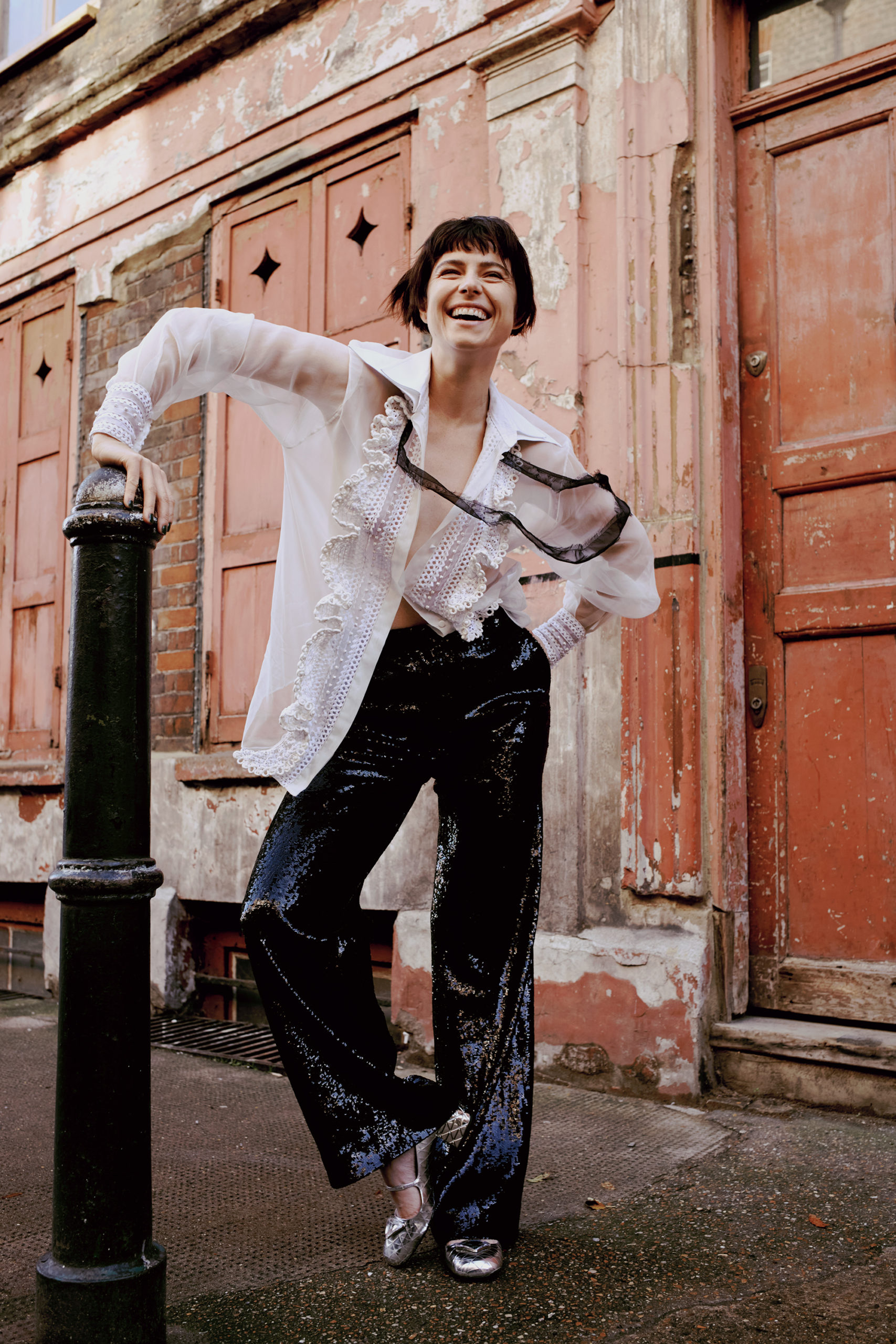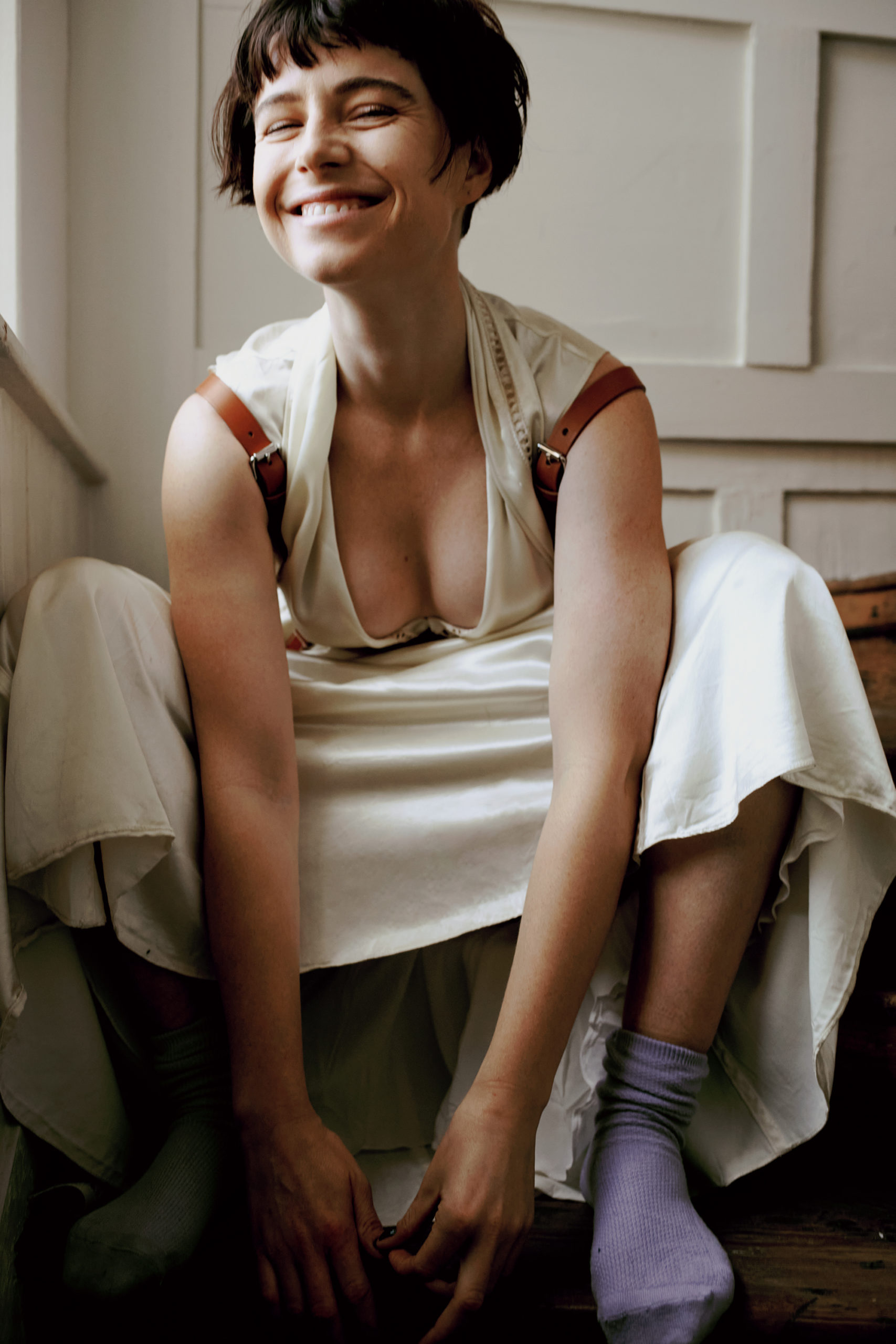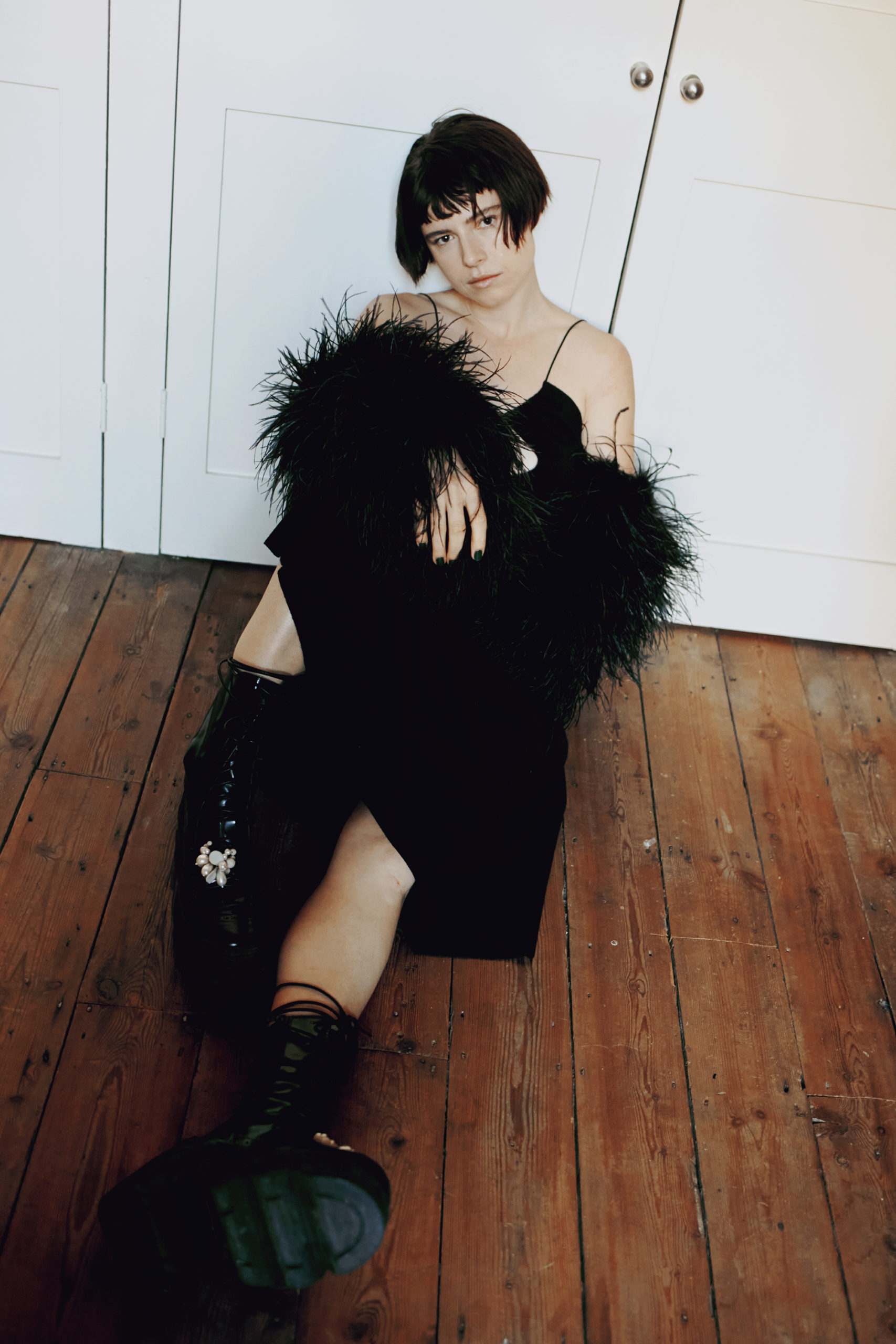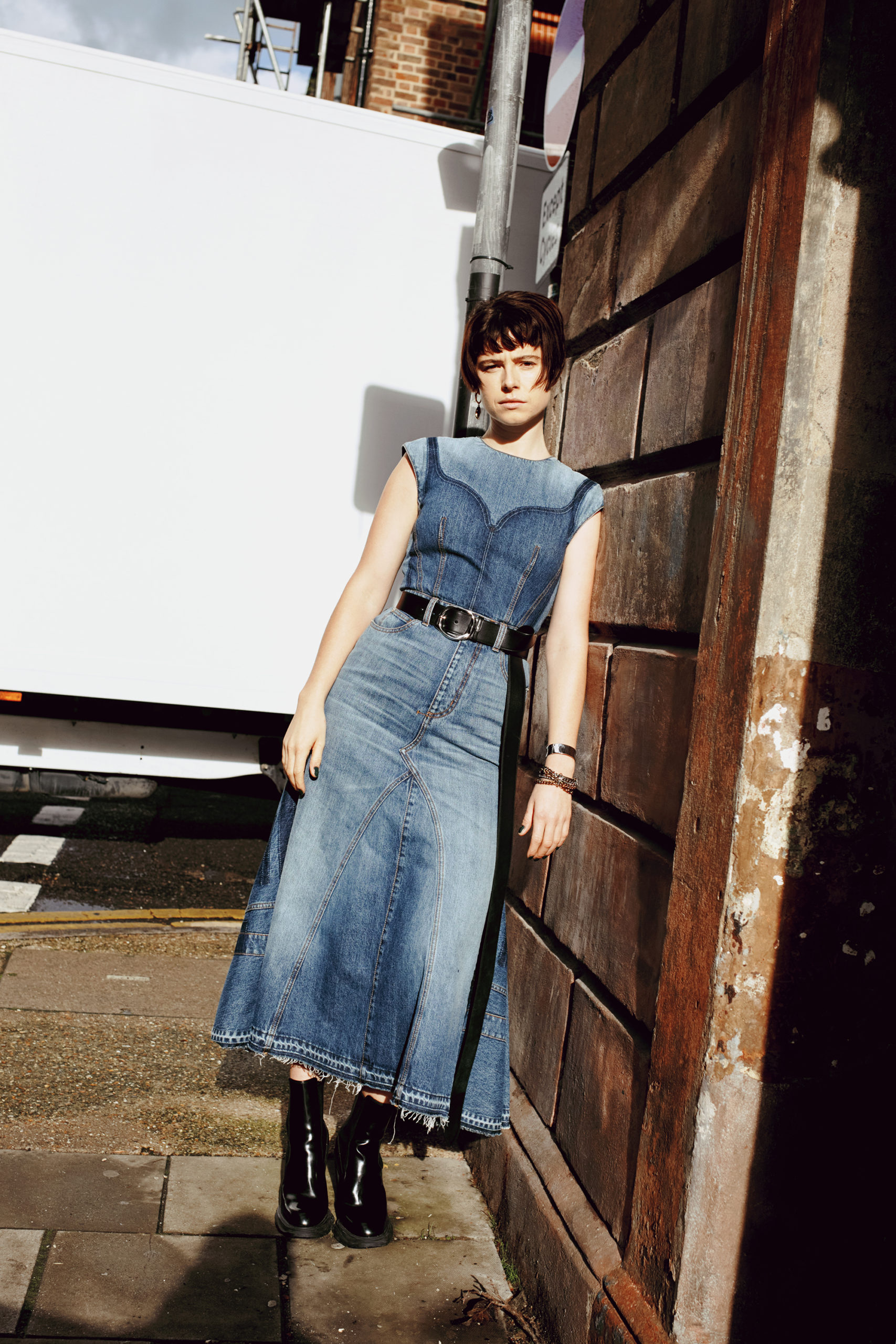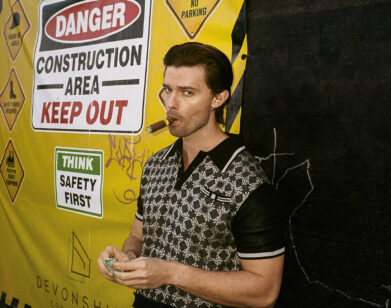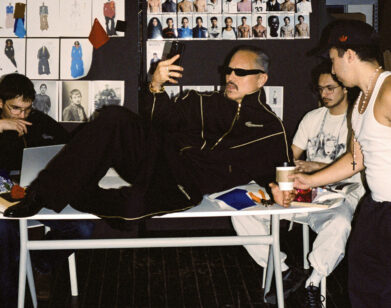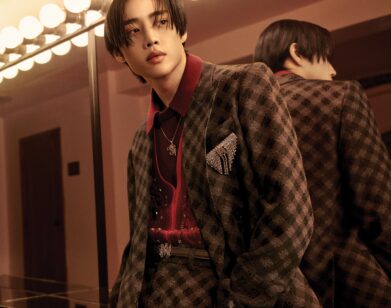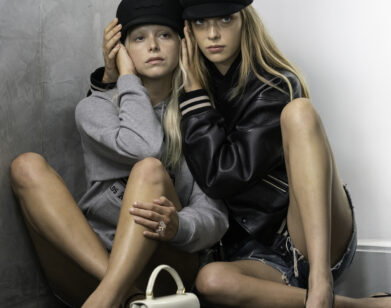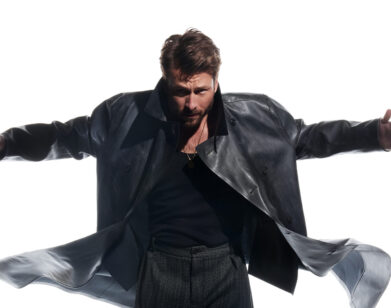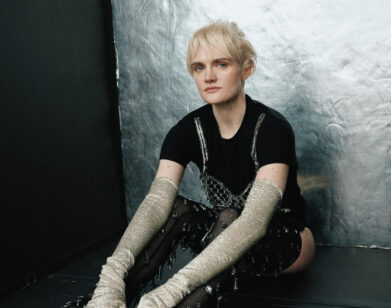Arrival
Jessie Buckley and Claire Foy on Bad Mothers and Lost Daughters
Movie theaters are, by definition, dark spaces. Jessie Buckley, somehow, lights them up. At just 31 years old, she is one of Hollywood’s brightest stars, capable of delivering performances that burn hot and contain multitudes, like the aspiring singer she played in her breakout Wild Rose, and the mercurial young woman she played in Charlie Kaufman’s trippy I’m Thinking of Ending Things. Her latest, as a desperate young mother who makes a decision to save the only life she can in Maggie Gyllenhaal’s directorial debut The Lost Daughter, is a lesson in the art of leaving it all on the screen. Claire Foy recently rang her up to find out how she pulled it off.
———
CLAIRE FOY: I miss you! How are Cabaret rehearsals going, darling?
JESSIE BUCKLEY: Good! It’s the last week, which is mad. But everybody’s lovely and brilliant, and there are these beautiful gazelle men in high heels.
FOY: Are you knackered?
BUCKLEY: The first week I was like, “I’m an 80-year-old woman, so that’s how this part is going to be played.” But I’ve gotten into the rhythm of it.
FOY: Do they have physiotherapists who look after your body?
BUCKLEY: Yes. Although I feel like a phony because compared to the others, I’m like a plodding potato.
FOY: [Laughs] Everybody loves potatoes! I can’t wait to see it. And I just watched your film. I hadn’t read the book [Elena Ferrante’s The Lost Daughter, on which the movie is based], so I had no idea what to expect, but it was very confronting.
BUCKLEY: Yeah, a woman came up to me after a screening a few weeks ago and she was like, “How did you deal with the cruelty?” I was like, “I haven’t. That’s probably bad.” But I don’t think my character’s cruel.
FOY: I don’t think she’s cruel either—I think she’s exhausted and unfulfilled.
BUCKLEY: And a woman and a mother and a daughter.
FOY: You share the character with Olivia [Colman], so that’s unique in the sense that she’s not just yours to make. Did you guys talk about how to approach it?
BUCKLEY: Maggie [Gyllenhaal] really early on was like, “I’m not going to ask you two to mimic each other.” It’s the same woman but at very different points in her life. If you tried to pigeonhole her, it would’ve done her a disservice. I think there was a point where Olivia was like, “Oh, can I watch some stuff that Jessie did?” And then she probably thought, “Oh…she’s doing it like that? That’s interesting.” [Laughs] But when I read the script, I was like, “I know this woman. I’ve seen her.” She’s my girlfriends and my mom and my sister and me, and the chain of that secret being let out and seen and spoken is what the film is about.
FOY: Sometimes when you watch a film and a character does something and your knee-jerk response is, “Oh no, no, no,” it’s mainly because what’s happening is too much like you, too confronting. A scene that I thought was so well observed is the one where your daughter hits you, and your reaction to it. I’ve never smacked my child, but for any person, when you’re basically someone’s servant and they hit you, you feel like, “I’m not a human being anymore—that’s basically what you’re telling me.” And the way that there was absolutely no judgment in your performance was really extraordinary. There wasn’t any feeling that what she was doing was wrong or that she was a bad mother, because what even is that?
BUCKLEY: Exactly. The film and the book made me think about, “What is a good mom?” Like, maybe going and living your life in some capacity for however long or in whatever way you find, if that’s what you need to do—maybe that’s the best thing you can give your child instead of them seeing you be smaller. It doesn’t mean you don’t still feel guilty. There’s a struggle on either side of that.
FOY: You’re such an alive, passionate person, which comes across in that character. She radiates life and potential. How did you find it playing someone who is basically trapped?
BUCKLEY: Terrifying. You do not bring that home.
FOY: Did you find that you battled against it? Or was it that you understood the fundamentals of why the character was staying, why she was leaving, what she was doing?
BUCKLEY: It didn’t feel totally alien to me. I don’t think it feels very alien to many of us. I didn’t feel like I had to put anything on. The thing I felt like I had to step into was to not really apologize. You can own a choice that may not be the status quo of motherhood. It might shake the chain a little bit, but what are you going to do? Are you going to suffocate and give that as a lesson to your daughter? Or are you going to go, “Actually, I want to choose to live, and I’m not going to apologize for that”?
FOY: That’s not a narrative that we talk about a lot.
BUCKLEY: Not at all.
FOY: You told me that you really enjoyed working with Maggie as a director. Was there anything in particular that you loved about how she worked?
BUCKLEY: I think she’s just a wicked and brilliant woman. It was her first film as a director, but it didn’t matter. Some people are natural leaders. And I think because she’s an actress too, she understood both sides of it. I was shy when I first met her. I remember seeing her in New York with some of my girlfriends and whispering, “That’s Maggie Gyllenhaal!” During shooting in Greece, we would send music and pictures to each other, and every evening we’d end up swimming in the exact same spot. I feel like I genuinely grew up on this film because I think Maggie knows those moments when, as a woman, you disempower part of yourself. She kept daring me, like, “Don’t do that. Own it. Don’t apologize for it.” I would have done whatever for her because she really understood.
FOY: That bond with a director doesn’t happen every time.
BUCKLEY: Yeah. And I think she wanted to do this film for a reason— for herself as a mother and wife and actress—so it didn’t feel objectified. It wasn’t like, “Let’s put women here, saying this.” It was a real experience that we were actually living together. She felt like an older sister who was saying, “Just go jump. I’ve got you.”
FOY: What are the ingredients that you need from a director to feel like you can challenge yourself or feel supported in a job?
BUCKLEY: The experiences I’ve had where I’ve been like, “Oh, this feels great,” are always when it’s an ongoing conversation rather than something that’s premeditated. I want a director to be as alive to the moment as I want to be. In a way, you have to let go of some of your ideas, and find the thing that’s actually living between you.
FOY: As long as it feels like you’re making it together, and you’re not just an actor-bot who is fulfilling some version of a film that they want to do, then, even if it’s messy or difficult, it’s alive and that comes across onscreen. Like with your performance in The Lost Daughter, it’s spontaneous, electric, unique, and complete.
BUCKLEY: Maggie just wants truth, and you can see that in her work. She’s a Hollywood star, but there’s something grounded about her. There’s complete transparency, which is what I want.
FOY: And a few compliments every once in a while.
BUCKLEY: And a biscuit and a cup of tea. Maybe a margarita.
FOY: When you’re working on sets where there are more and more women in positions of authority, has it made you look around and think that you would like to direct or write something?
BUCKLEY: I don’t feel like I want to direct right now and I wouldn’t know how to write, to be honest.
FOY: You do.
BUCKLEY: Claire is now also my agent. [Laughs]
FOY: I would make such terrible choices for you.
BUCKLEY: I’d love to build an idea from the root up. My dream has always been to have a little farm of core creatives where you’d have a cinematographer, a writer, a director, and some actors, who would all build something from nothing—like in the old Disney rooms where they used to put all of these writers in front of freshly painted white walls and give them a marker, and they’d write their ideas up on the walls and bring them all together and make Pinocchio.
FOY: I could see you doing that. Or even if you did something improvised, where you didn’t know what the beginning or end was going to be. As your agent, maybe that’s something you could do. So, you said that you shot The Lost Daughter in Greece, right?
BUCKLEY: Yeah, it was amazing. Everybody should try to do at least one film a year on a Greek island. I’d get up and have a swim in the morning before work, and one again after work. And then we’d all bottle up to Olivia’s and drink too much rosé and have singalongs until like 2 a.m. And then I’d be like, “Shit, I need to go to bed,” and she was always like, “No, stay for one more!”
FOY: I’m really jealous.
BUCKLEY: I know. These are the kind of films we need to be making in our future production company.
FOY: So now you’re doing a play.
BUCKLEY: Yeah. It’s nice being back in the theater. And this company in Cabaret, they’re a really beautiful bunch.
FOY: Are you feeling like you’ve got a routine now? Because with theater, even though the hours are a bit funky, you know where you’re going to be for the next couple of months.
BUCKLEY: Yeah, that’s really nice. It’s good being back in London and just having a bit of normal time.
FOY: Will you get to go back to Ireland soon?
BUCKLEY: Probably not until March. My favorite place in the world is our caravan by the sea in Ballinskelligs, which we’ve had since I was like five. It’s this really magical place. There are six other caravans, and only one pub, and it’s in a field, right on the beach.
FOY: Do you feel that the environment you grew up in has actively influenced you?
BUCKLEY: I guess so. This might sound mad, but where I grew up in Ireland, in the nature that’s around, things just grow. Nothing is planted, necessarily. They grow, they die, and then come back, and it’ll always look different. I feel very aware of that in me.
FOY: Are you decisive about roles? Do you instinctively know whether it’s a woman that you want to play?
BUCKLEY: Yeah. To be honest, those kinds of scripts come around probably once a year. And then there are other times you take a job because you want to work with certain people or explore something new. But sometimes I’m worried that I’m just reacting to something from where I’ve come from. That’s why you have to stop and clean the plate and be like, “What am I looking to do?” I think you probably meet different stories at different points in your life for a reason.
FOY: People always ask, “What’s the common thread between all of your characters?” But do you think there is one? Is there a particular thing about the women that you play that keeps coming back?
BUCKLEY: I don’t feel aware of it. Maybe other people do, like, “We’ve seen her doing that before.”
FOY: And like, “Do I always pick people like that, or do I make them like that?”
BUCKLEY: Yeah. The only thread is me.
FOY: What about The Lost Daughter? What was the thing that was different for you with that?
BUCKLEY: It was like, what is the legacy of mother and daughter? And how much of something that we’ve always understood as a practice is really truthful to what it’s like to be a human being? And what happens if we actually try something else? Also, the idea of not waiting for somebody to give us that opportunity, but just taking it ourselves, because it could be brilliant. That doesn’t mean that it’s not going to be painful, because that’s life. You can’t avoid the struggle part of life, but you can choose the life part of life.
———
Hair: Mark Francome Painter using Living Proof
Makeup: Jenny Coombs using Danessa Myricks at The Wall Group
Photo Assistant: Francesco Zinno
Fashion Assistant: Apolline Coquet

